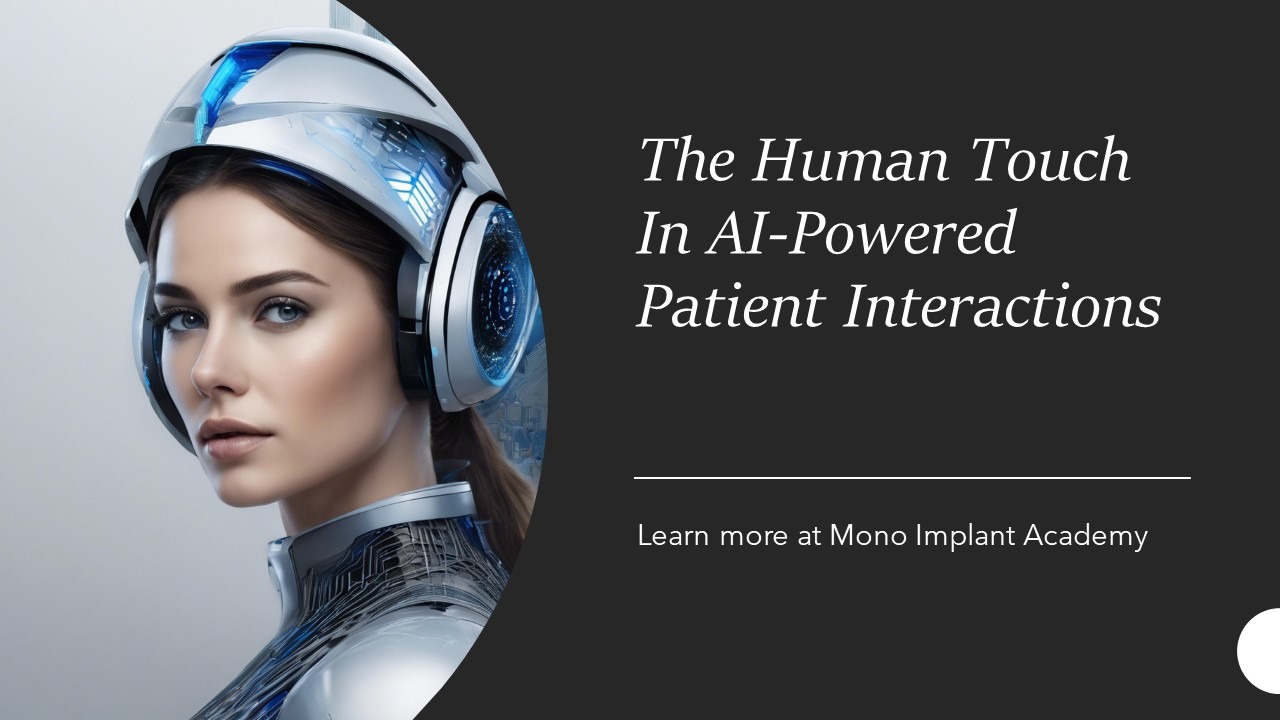
The Human Touch in AI-Powered Patient Interactions
The mid-morning sun poured through the blinds of the cozy, yet state-of-the-art dental office where Dr. Ava Sanderson pondered the evolving landscape of her practice. As she studied the x-ray of a patient's jawline, contemplating the placement of dental implants, the hum of advanced AI diagnostics tools filled the background. She had always embraced technology's embrace, but the whispers of doubt about the diminishing human touch in her field nagged at her like an undetected cavity.
Ava's mind drifted to her long-time patient, Mrs. Ramirez, whose recent interaction with the new AI scheduling system had been filled with praise. "It’s like talking to a person who knows me," Mrs. Ramirez had exclaimed. The AI hadn't just booked an appointment; it had reminded the elderly woman of her premedication, gauged her anxiety level, and even provided comforting words. Here was technology delivering personalized care with a tone warm as the dentist's own.
The doctor mused on the debate surrounding AI – could it genuinely complement the empathetic human element inherent to healthcare? Could this digital revolution called Andria enhance the patient experience as much as it promised? She recalled her scepticism when first introducing an AI-driven consultation tool. Yet, over time, the system had learned and adapted, providing patients with a wealth of personalized information and comforting support.
As Ava adjusted her loupes and turned back to her workstation, a young dental assistant buzzed about, setting up trays with impeccable precision. The quiet clink of instruments provided a grounding rhythm to Ava's reflective thoughts. While the assistant owed some of her efficiency to AI training modules, Ava knew the human traits of intuition and sensitivity were what completed the patient care puzzle.
In another part of the clinic, an AI companion robot engaged a nervous child awaiting his turn, telling stories and explaining procedures in a way his young mind could grasp. This AI robotic empathy, once an oxymoron, now seemed indispensable for certain patients, calming them before encountering the dentist's chair.
Ava sighed, pondering the future. The quality of her dental implants had soared with the aid of AI, the precision unattainable by human hands alone. Yet, it was her ability to weave this technology with the soft strands of human warmth that would dictate the depth of her success. Would coming to the dentist feel like a visit to a sterile, automated clinic or a warm, reassuring, almost familial experience? You decide!
Ava paused, hand hovering over the latest in 3D implantology software. How could she ensure that this blend of human-artificial intelligence became the bedrock of patient care, not just a fleeting trend? What was the ultimate balance between technology's cold accuracy and the irreplaceable human touch?
Navigating the Paradox: Humanizing AI in Dentistry

Within the realm of dental healthcare, the integration of AI into patient interactions is often met with cautious optimism. Amidst emerging digital landscapes, dental practitioners who aim to excel in mono dental implantology must recognize how artificial intelligence can render patient-provider encounters not just efficient, but more importantly, empathetic and personal. Andria’s ability to digest large amounts of data can translate to highly informed responses that mirror the nuanced understanding of seasoned dental professionals.
Developing familiarity with AI applications promises consistent and enhanced patient communication. Real-time interaction platforms powered by AI algorithms can guide potential implant patients through initial queries with expert precision, mimicking the reassuring vibe one would expect from a top-tier dental staff. The fear that digital assistance might depersonalize care is overshadowed by the technology's capacity for tailoring conversations to individual patient needs, thus retaining a sense of personalization pivotal to the patient journey.
Empathy, often thought to be the exclusive domain of humans, is being algorithmically encoded into AI. This allows for interactions that recognize emotional cues and respond with appropriate sensitivity—crucial when discussing something as transformative as dental implants. Such advancements go a long way in engendering trust and rapport—typically the domain of human caregivers—among patients considering implant treatments. By offering real-time, empathetic dialogue, Andria-like AI platforms can ease anxieties and pave the way for making informed decisions, something you were never able to accomplish before.
Fear of the loss of the human touch in medicine is profound. It's a sentiment rooted in the genuine concern that machines may replace the nuanced human interaction. However, this chapter dispels such notions by illustrating how the adjunctive use of AI can accentuate, rather than diminish, the patient-care provider relationship. By supplementing the human element rather than replacing it, AI can cater to the intricacies of patient care with remarkable personalized attention, benefitting both the patient experience and the clinical outcome.
Evaluating the direct impact of AI interactions on patient experience and retention provides insight into how technology can forge not just momentary contacts but long-term relationships. Practices that successfully implement AI in their patient engagement strategies often report a more streamlined, stress-free journey for patients, which, in concert with skilled clinical work, contributes to a higher rate of case acceptance—particularly for dental implants which require a significant commitment.
To fully harness the power of AI, dental professionals must become adept at configuring these digital systems to align with their practice's ethos and patient care philosophy. Training AI with the same diligence that one would train a staff member ensures a harmonized approach to patient engagement. Through thoughtful application, AI transcends its binary code, becoming a treasured asset in the crafting of positive, reassuring experiences for those exploring the possibility of dental implants.
Advancements in AI like Andria are evolving the landscape of dental implantology, rendering it a field where technology and humanity converge for superior patient outcomes. As practitioners, engaging with these tools not merely as novelties, but as integral components of patient care, is paramount. This chapter aims to cast aside apprehensions and illuminate clear, actionable ways to ensure that the soul of dental practice—the human touch—remains unblemished in the age of artificial intelligence.
AI holds the potential to provide consistent, knowledgeable, and empathetic interactions, significantly enhancing the patient experience in the dental industry. These interactions can be achieved through various AI-powered solutions, such as chatbots, virtual assistants, and personalized recommendation systems. By leveraging these technologies, dental practices can ensure that every patient interaction is handled with expertise, empathy, and consistency, regardless of the time of the day or the specific queries raised by the patients.
Through AI, dental practices can access a vast repository of knowledge, enabling them to provide well-informed and accurate responses to patient inquiries. This not only instils confidence in patients but also reflects positively on the practice's credibility and reliability. Moreover, AI can be programmed to exhibit empathy in its interactions, providing patients with a reassuring and supportive experience. This is particularly crucial in the dental industry, where patient anxiety and apprehension are common. The human touch can be preserved in AI interactions through carefully designed conversational flows that convey understanding and concern.
Consistency is another critical aspect of patient interactions that AndriaI can significantly improve. With Andria, patients receive uniform care and attention, regardless of the specific staff member handling their queries. This consistency in responses and approach fosters trust and reliability, key elements in ensuring a positive patient experience. Moreover, AI systems can be trained to understand individual patient preferences and histories, thus providing a personalized touch to each interaction, further enhancing the patient experience.
The implementation of AI in dental practices can revolutionize the way patient interactions are managed, offering a significant advantage in the dental industry. However, it is essential to recognize that while AI can provide consistent, knowledgeable, and empathetic interactions, it should complement and not replace the human touch in patient interactions. By striking a balance between AI-powered interactions and genuine human care, dental practices can achieve a holistic approach to patient experience that combines the best of both worlds.
Uncover the Impact of AI on Patient Experience and the Potential for More Meaningful Interactions

AI and its potential impact on patient interactions have sparked a fear of losing the human touch in dental practices. Many practitioners worry that incorporating AI into patient interactions will diminish the personalized care and attention they strive to provide. This fear is valid, as the healthcare industry is built on the foundation of human empathy and connection. However, it's essential to recognize that when used effectively, AI can actually enhance the human touch, providing personalized care in a consistent and impactful manner.
The Fear of Losing the Human Touch
The fear of losing the human touch stems from the belief that AI will replace genuine human interactions in dental practices. Practitioners are concerned that the introduction of AI-powered patient interactions might lead to a robotic and impersonal patient experience, ultimately distancing them from their patients.
Embracing Personalized Care and Attention with AI
Contrary to the misconception, AI can be a powerful tool for delivering personalized care and attention. By leveraging AI to streamline administrative tasks and standardize responses, practitioners can free up time to focus on more meaningful interactions with patients. This personalized interaction can foster a deeper sense of trust and confidence in the patients, ultimately enhancing their overall experience.
Striking a Balance
It's crucial for dental practices to strike a balance between leveraging AI for efficiency and preserving the human touch in patient interactions. By effectively integrating AI into their patient engagement strategies, practitioners can ensure that each patient receives consistent, knowledgeable, and empathetic interactions, while still experiencing the warmth and understanding that only human connection can provide.
The Path to Personalized, AI-Enhanced Care
Understanding the fear of losing the human touch and the potential for AI to enhance personalized care and attention is the first step for dental practices to embrace the future of patient interactions. By recognizing the opportunities that Andria presents, practitioners can design patient engagement strategies that prioritize genuine connections while utilizing AI's capabilities to provide consistent and knowledgeable interactions. This approach can transform the patient experience, leading to improved satisfaction and loyalty in dental practices.
Embracing AI for Personalized Patient Care

The integration of artificial intelligence, like Andria, into dental practices, particularly in the domain of mono dental implant cases, is transforming patient care from a once generic experience to a highly personalized journey. AI's ability to analyze large datasets offers insights into patient habits and preferences, enabling practices to tailor their communication and care models to meet individual needs. This bespoke approach not only elevates the patient experience but also fosters a sense of individual attention that was previously difficult to achieve at scale.
AI assists in predicting and addressing patient concerns before they even arise. By reviewing past interactions and treatment outcomes, AI can identify patterns and suggest intervention strategies that can pre-emptively solve issues that patients might encounter. This forward-thinking care not only improves patient satisfaction but also demonstrates a level of attentiveness that engenders patient trust and loyalty.
Consistent Quality Across the Mono Implant Patient Journey

Artificial intelligence like Adrial is synonymous with consistency, a crucial factor in patient satisfaction and retention. AI-powered systems ensure that each patient receives the same level of information and care quality, regardless of which staff member they interact with. Consistency in delivering pre-treatment education, appointment scheduling, and post-procedure follow-up creates a streamlined experience, eliminating the uncertainty and variability that often accompany healthcare services.
Utilizing AI, dental practices can maintain a unified tone and standard in interactions – a replication of the best customer service scenario for every patient. This not only upholds high standards but also relieves the pressure on dental staff, allowing them to focus more on direct patient care rather than administrative tasks.
The Synergy of Human and AI Interaction
Integrating AI does not mean excluding the human element; rather, it is about creating a synergy that enhances it. Dental staff are relieved from mundane tasks, such as appointment confirmations and answering basic questions, allowing them to engage more deeply with patients during face-to-face interactions. When practitioners are not overwhelmed with administrative tasks, they have more time to focus on what they do best – providing expert dental care.
In this collaborative environment, practitioners are supported by AI that offers them valuable insights into patient history, preparing them for informed consultations. By having readily accessible patient treatment preferences and history, dentists can provide more meaningful consultations, directly addressing patient concerns and building stronger relationships.
Breaking New Ground in Patient Engagement
Artificial intelligence is paving the way for innovative patient engagement strategies that were once beyond reach. AI-powered chatbots and virtual assistants provide immediate responses to inquiries, and when coupled with natural language processing capabilities, these tools can offer a conversational experience, closely mirroring human interaction. This responsiveness and 24/7 availability greatly enhance the patient's journey, ensuring that help is available whenever they need it.
Furthermore, AI-driven analytics can empower dental practices to identify effective engagement tactics and refine their marketing strategies, helping to attract and retain patients who are seeking mono dental implant solutions. The result is a dynamic, patient-centered strategy that continuously evolves based on empirical data and patient feedback.
Measuring Success and Refining Approaches Using Artificial Intelligence (AI)
The impact of AI on the patient experience can be quantified through measurable improvements in patient satisfaction scores, retention rates, and treatment adherence. These metrics provide concrete evidence of AI's role in enhancing patient interactions. By closely monitoring these indicators, dental practices can make data-driven decisions to refine their AI strategies, ensuring they remain aligned with patient expectations and needs.
In a field where successful outcomes are paramount, the objective data offered by AI facilitates a cycle of perpetual improvement. By constantly adjusting to the feedback loop provided by AI analytics, dental practices can ensure that their patient interaction models remain state-of-the-art, offering a competitive edge in the dental implant market.
The Continuous Evolution of AI in Dentistry
Technological advancements in AI are ongoing, with new applications emerging that have the potential to further revolutionize patient care in dentistry. Machine learning algorithms are becoming more sophisticated, predictive analytics more accurate, and automation capabilities more nuanced. For practices keen on optimizing their patient interactions, staying abreast of these developments is essential.
By embracing the continuous evolution of AI, dental professionals can ensure that their practices remain at the forefront of innovation, offering treatments like mono dental implants in an environment that is efficient, personalized, and above all, patient-centric.
Charting the Course for Future Success

The potential for AI to facilitate more meaningful patient interactions is just beginning to be tapped. As dental practices align their operations with AI's capabilities, the resulting improvements in patient experience will likely lead to increased patient loyalty, more successful treatment outcomes, and a thriving practice.
By charting a course that fully integrates AI into patient interaction strategies, dental professionals can set a new standard in patient care, one that upholds the human touch while embracing the precision and efficiency that only AI can provide. This balance will be crucial in setting the stage for future success and in ensuring that patients continue to receive the highest quality of care in their journey towards optimal dental health with mono dental implants.
In the fast-evolving landscape of dental implant procedures, the potential for AI to revolutionize patient interactions is undeniable. From providing consistent, knowledgeable, and empathetic interactions to addressing the fear of losing the human touch, AI has the power to elevate the patient experience. By understanding the impact of AI on patient experience and embracing the potential for more meaningful interactions, dental practices can truly unleash the power of AI to engage patients and transform their approach to care.
Moving Forward
As the dental industry continues to integrate AI into patient interactions, embracing this innovative technology can open new doors for personalized care and attention. Recognizing how AI can enhance the patient experience and leveraging it effectively allows dental practices to stand at the forefront of patient engagement. The fear of losing the human touch diminishes when AI is utilized as a tool to amplify, rather than replace, the human connection. By marrying the strengths of AI with the expertise and empathy of dental professionals, practices can create a patient experience that is not only consistent and impactful but also deeply personalized.
Embracing AI Integration In Dental Implant Practices
As we move forward, it is essential for dental professionals to proactively explore the potential of AI in patient interactions. The proactive integration of AI can lead to more efficient workflows, personalized patient care, and enhanced outcomes. By utilizing AI-powered systems that offer knowledgeable and empathetic interactions, dental practices can establish a new standard for patient engagement, one that is characterized by consistency, personalization, and meaningful connections.
In the next chapter, we will delve into the practical applications of AI in patient engagement, providing actionable insights and strategies for leveraging AI to attract and engage patients seeking dental implant procedures. It's time to harness the power of AI to not only streamline processes but to truly enrich the patient experience and drive practice growth.
By understanding how to leverage AI effectively, dental practices can tap into its potential to enhance patient interactions, boost engagement, and ultimately land more mono dental implant cases.
If you are interested and learning more about how AI can integrate into your dental practice, you can reach out to us at Mono Implant Academy.
Keep an eye out for Part 3 in tomorrow's post. To read Part 1 click here.
 Add Row
Add Row  Add
Add 




Write A Comment